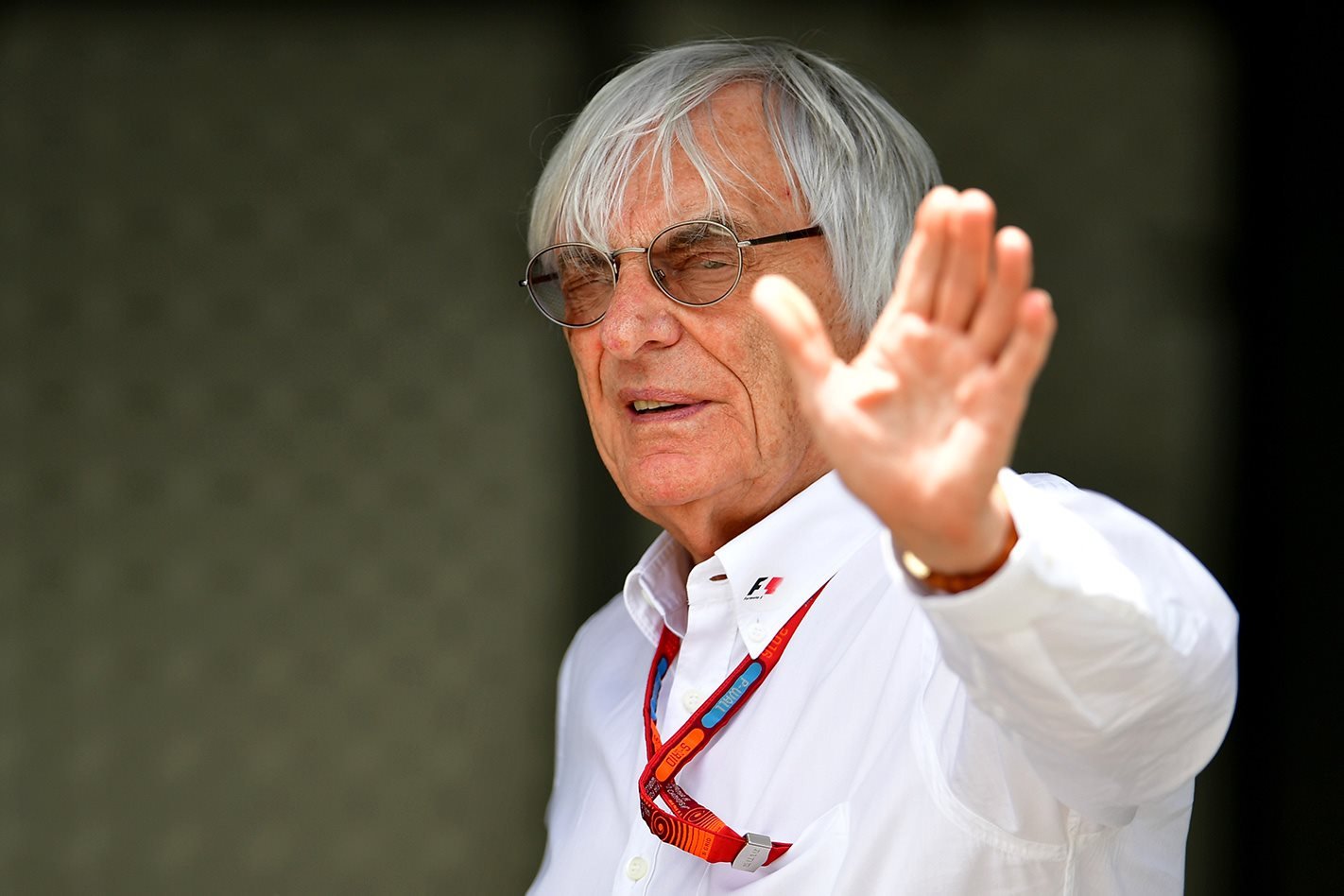Melbourne might not be hosting the Australian Grand Prix if it were not for Bernie Ecclestone. In fact, there might not have ever been an Australian Grand Prix in the first place if it were not for Bernie.
Ecclestone played an instrumental role in getting Adelaide to stage Australia’s first world championship Formula 1 race in 1985. That’s not to say that if Ecclestone had not been around that Formula 1 would never have made it to Australia in the past 30-odd years, but he was the first person to get the job done here Down Under.
One year later the first Formula 1 race was held behind the Iron Curtain. Bernie did that. The Hungarian Grand Prix, like Australia, is now a fixture on the calendar.
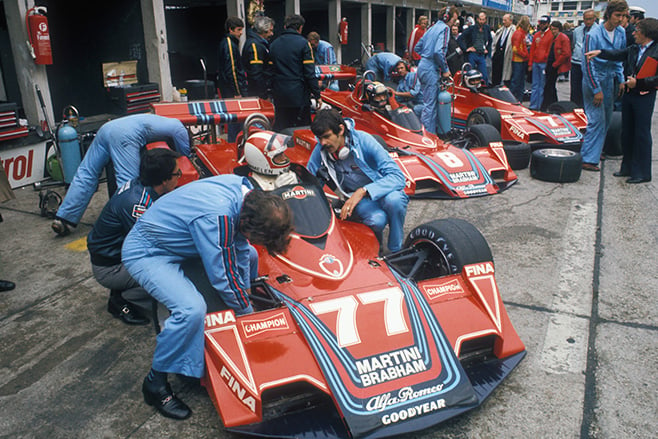
Ecclestone ruled Formula 1’s commercial side for 40 years, and he planned to keep running the show. At the Canadian Grand Prix last June, during the announcement of the new lucrative Heineken sponsorship contract – another Ecclestone deal – he said the news of his retirement would be broadcast from the funeral parlour.
As it turned out that announcement came early this year on January 23, which was just days after the Federation Internationale de l’Automobile (FIA) had announced that it had approved the sale of the majority of Formula 1’s commercial rights to Liberty Media. Initially it was believed that Liberty would give Ecclestone, now 86, a three-year contract to continue to run the business just as he had done for the previous owners including the most recent one – CVC Capital Partners.
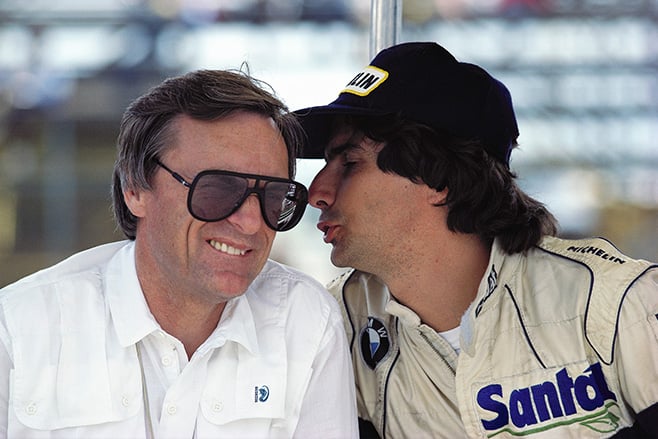
Liberty gave Ecclestone the role of Chairman Emeritus of Formula 1. He can offer advice but he can’t conclude deals, and Bernie has thrived on making deals. He is the one that turned the sport and business into a multi-billion-dollar global affair. And he helped turn the Formula 1 brand into a household name rather than something only known to racing fans.
With marques like Alfa Romeo, Maserati, Ferrari, Lotus and Honda, and big name teams like BRM, Cooper, Tyrrell and McLaren, it’s not like Formula 1 was just a bunch of amateurs messing about with racing cars before Ecclestone started to take over.
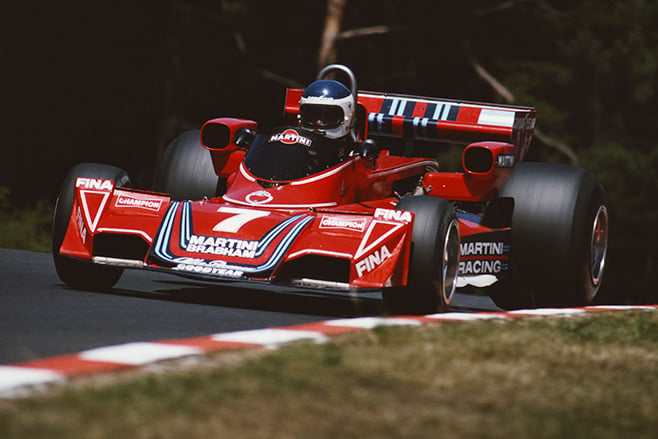
Yet when it came to maintaining power and control, such as when a majority of the teams planned to strike off on their own with the Formula One Teams Association (FOTA) in 2009, Ecclestone deployed another favourite weapon in his powerful arsenal – divide and conquer. He did individual commercial deals with first Red Bull and then Ferrari. FOTA crumbled.
Still, along with his wheeling and dealing on a global scale, Ecclestone was, and is, a racer. For all his ruthless negotiating, he loves the concept of drivers and cars competing on the track.
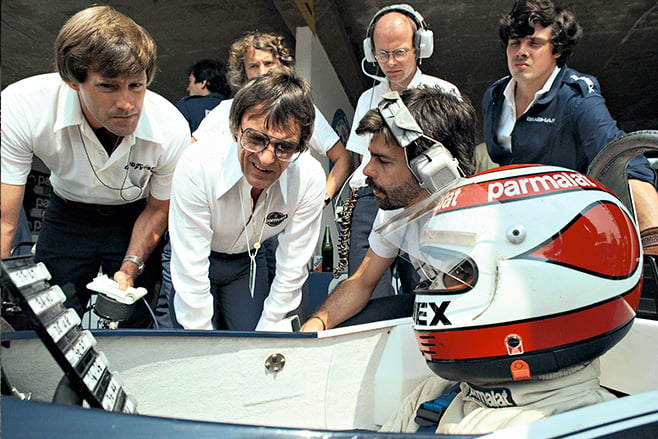
In 1957 he bought the remnants of the Connaught Formula 1 team, and he tried and failed to qualify one of the cars in the 1958 Monaco Grand Prix. Stuart Lewis-Evans, who drove for the team and was managed by Ecclestone, died of severe burns suffered in a fiery accident in the 1958 Moroccan Grand Prix. That prompted Ecclestone to retire from driving for good and to walk away from racing.
Ecclestone returned and became the manager and friend of Jochen Rindt only to suffer more grief when Rindt died in a crash during practice for the 1970 Italian Grand Prix. One journalist recalls seeing the sad figure of Ecclestone walking from the accident scene back down the Monza straight to the pits carrying Rindt’s helmet.
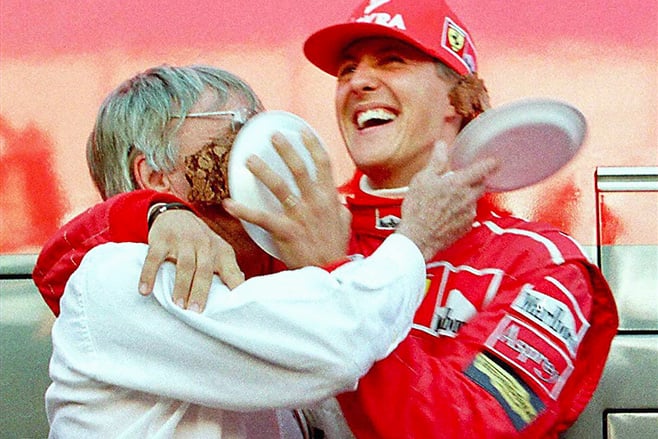
Meanwhile, Ecclestone was becoming a mover and shaker and taking the first steps that would make him a billionaire and the boss of Formula 1. The basic idea of a teams’ union had been in place already, but Ecclestone and other team bosses formed the proper Formula One Constructors’ Association (called F1CA and later FOCA) in 1974. Ecclestone turned it into a force to be reckoned with. In the early days each team negotiated individually with each track organizer for starting money. Ferrari could command a lot of dosh while a small team had to settle for the dregs.
Ecclestone banded the teams together and offered the tracks an all-of-us-or-none-of-us proposition. Naturally, he kept raising the price, but FOCA also guaranteed the tracks a full field of cars and drivers.
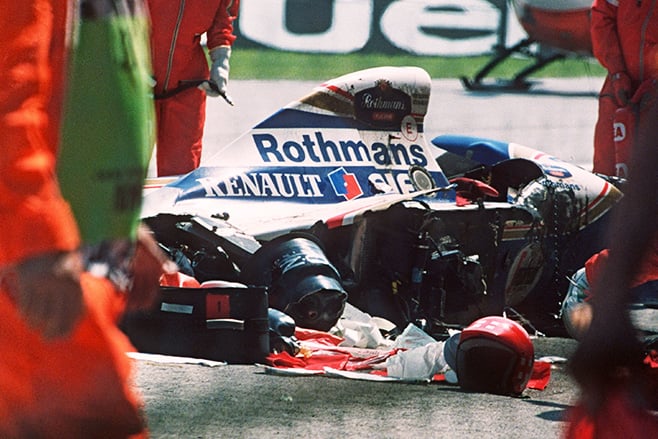
Things were finally settled in 1981 with the Concorde Agreement, a document that exists to this day and stipulates how the sport and business are run. The basics were that FISA ran the regulations and technical side of things while Ecclestone ran the commercial business.
Ecclestone was one of the first to recognise how lucrative television would be, and he set off doing deals with various broadcasters around the world. He also became involved in advertising, sponsorship and hospitality at the race tracks, effectively freezing out the organisers and taking all the money. And, of course, he kept increasing the fees those tracks had to pay to get a Formula 1 race – the standard contract still calls for a 5 to 10 per cent raise per year. How many other businesses can claim that sort of guaranteed growth? The only way the tracks could make money, and this still holds true today with current venues, was by raising ticket prices for the fans and by calling for government funding.
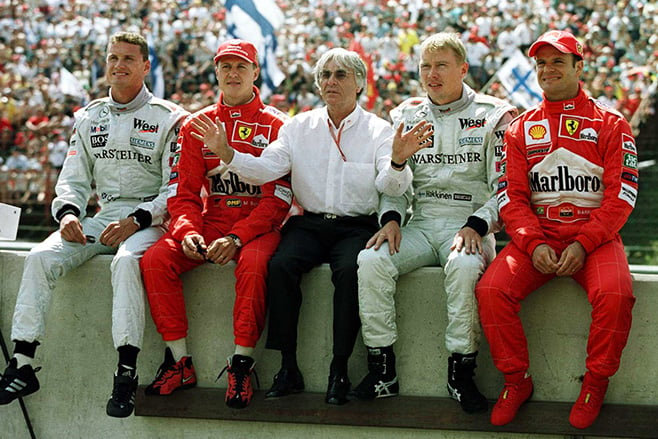
Still, the team bosses and drivers were earning money, and quite a few were becoming millionaires. Ecclestone, meanwhile, was becoming a billionaire.
In 1996 he paid the FIA a measly US$360 million for Formula 1’s commercial rights for 100 years. He then set about selling shares. That was something he later would say was one of his biggest regrets. It started in 1999 when Morgen Grenfell Private Equity bought 12.5 per cent. Over the years a number of different banks and investment companies, some of which went out of business along the way, bought shares. In 2005, CVC Capital Partners became the major stake holder with 63.4 percent.
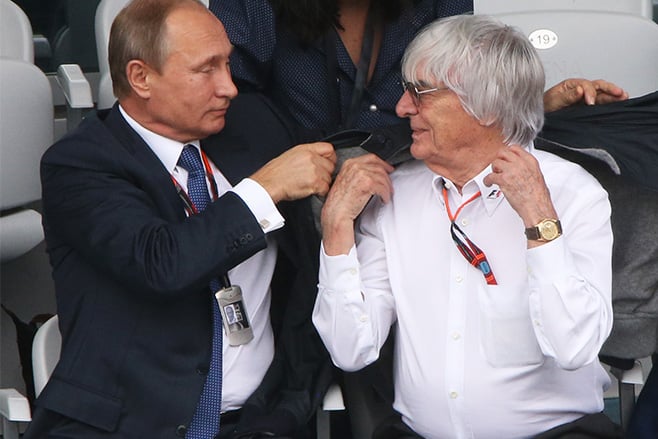
Throughout his ruling decades Ecclestone continued to expand Formula 1 into different countries while at the same time culling some of the traditional European races. His ventures did not always pan out. Races in places such as Korea, India and Turkey eventually failed.
Ultimately, trying to ram Formula 1 down the throats of people who knew little about the sport but were asked to pay high ticket prices just didn’t work. But there have been hits from Australia to Singapore to Mexico to Japan and, while it took time, China. The jury is still out on Russia. Other events like Bahrain and Abu Dhabi are cash cows that add considerably to Formula 1’s profits.
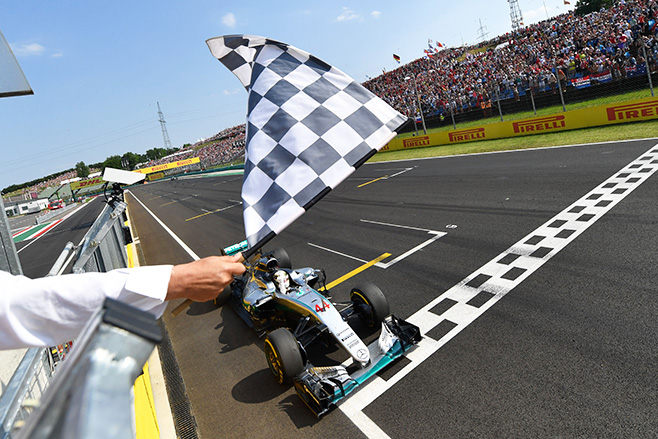
His “women should be dressed in white like all other domestic appliances” remark did not go over well, nor did his praise for Adolf Hitler for being “able to get things done,” nor his statement that “democracy … hasn’t done a lot of good for many countries” including the United Kingdom. Ecclestone’s close association and praise of Russia’s President Vladimir Putin hasn’t made him popular in some quarters.
Ecclestone’s vision and drive and tactics were very effective. But, as Chase Carey says, things have stagnated in the past few years. Television viewing figures are down, and Ecclestone has shunned social media which has changed the world.
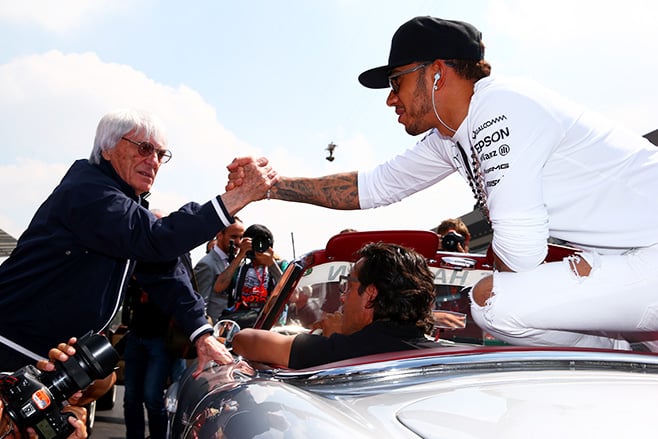
Grand Prix racing has been around for 100 years, and it will exist in some form or another for a long time to come. For 40 of those years Bernie Ecclestone ruled and expanded an empire into what it is today. But the time has now come to say goodbye to Bernie.
The Era of Ecclestone
The life and times of F1 and its most influential figure
1949 READY TO RACE Ecclestone takes to the track and races a 500cc Formula 3 at Brands Hatch
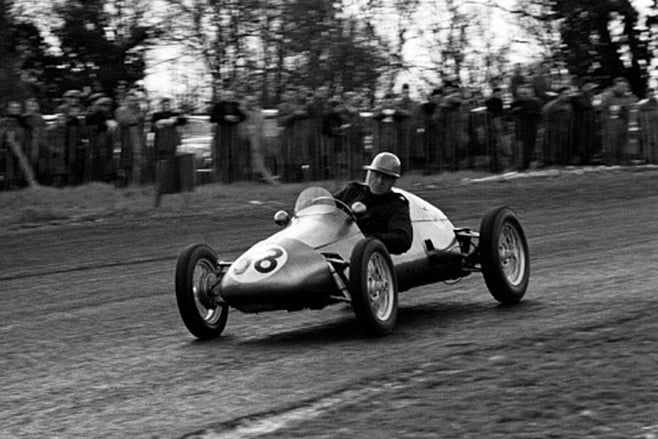
1970 LOSS OF A MATE Manager and friend of Jochen Rindt, his death takes a toll and leads to Bernie leaving racing
1978 BACK IN THE GAME Ecclestone buys the ailing Brabham team for £100,000, but endures an unsuccessful 1972
1974 TOP OF THE PODIUM The South African GP is the first win for Bernie’s Brabham with Carlos Reutemann at the helm
1978 TAKING THE LEAD Bernie becomes chief executive of FOCA and battles with FISA head Jean-Marie Balestre
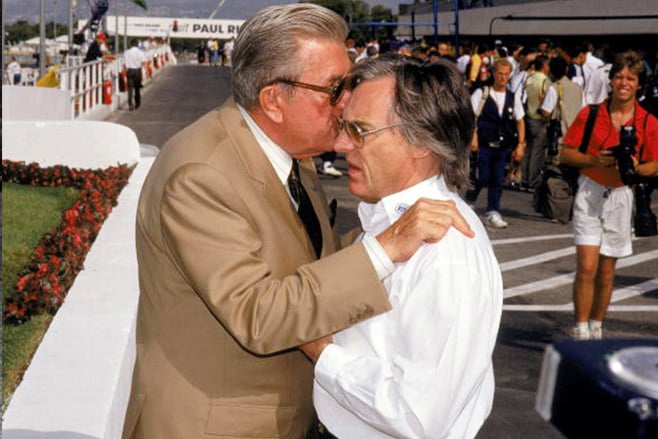
1985 LAND DOWN UNDER Bernie leads the charge to bring F1 to Adelaide. Senna claims pole, but Keke Rosberg wins
1987 CHANGE IN FOCUS Brabham is sold for more than $5m so that Ecclestone can ramp up his F1 involvement
1994 DEATH OF A GREAT Senna’s family did not allow Ecclestone to attend the funeral after the fatal crash at Imola
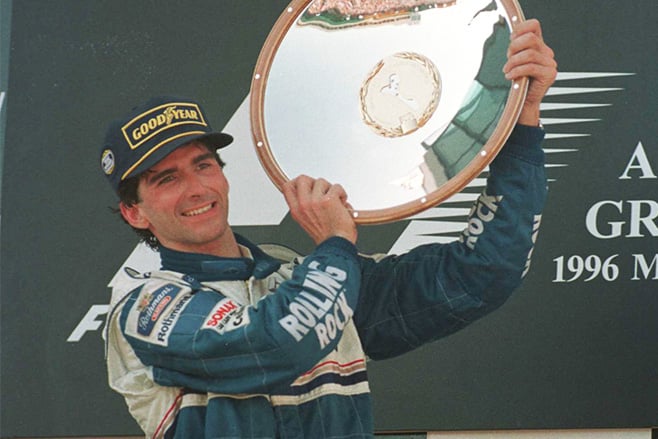
2005 ON DANICA PATRICK “Women should be dressed in white like all the other domestic appliances”, Bernie said
2015 SCHUMACHER VISIT “I don’t want to see Michael like that”, Bernie said on why he won’t visit the F1 great
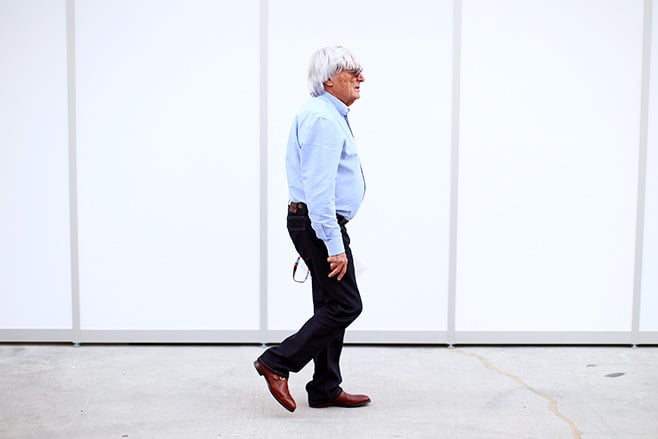
Post Bernie, Now what for F1?
CVC Capital Partners, the most recent majority shareholder of F1’s commercial rights, was happy to sit back and rake in profits while letting Bernie run the business. The new majority stakeholder Liberty Media plans to take a much more proactive role. Yes, Liberty is in this to make money, but it also plans, unlike CVC, to invest, improve and expand the entire Formula 1 product.
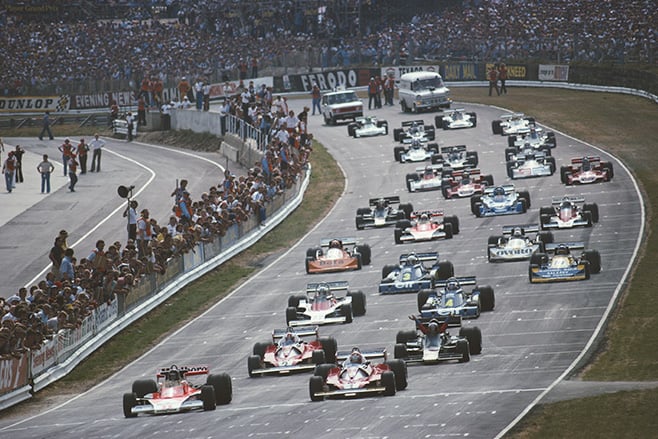
Such was Ecclestone’s control over Formula 1 that Liberty had to put in three people to take over his tasks. Liberty Media’s Chase Carey became the Chairman and CEO of Formula 1, former ESPN marketing executive Sean Bratches is the new Managing Director of Commercial Operations and former F1 technical director and team boss Ross Brawn became the Managing Director of Motorsports.
Carey detailed his plans for a two-prong strategy. “One,” he said, “put an organisation in place that lets us make these events everything they can be, reaches out to digital media that we’re not connecting to today, build an organisation that connects with the fans and enables the fans to connect with the sport.
“And, on another level, to really build a spirit of partnership with our teams, promoters, sponsors and broadcasters that will enable us to work together.” That vision differs considerably from CVC’s profits-only strategy of the past. Indeed, interesting times ahead for F1.

